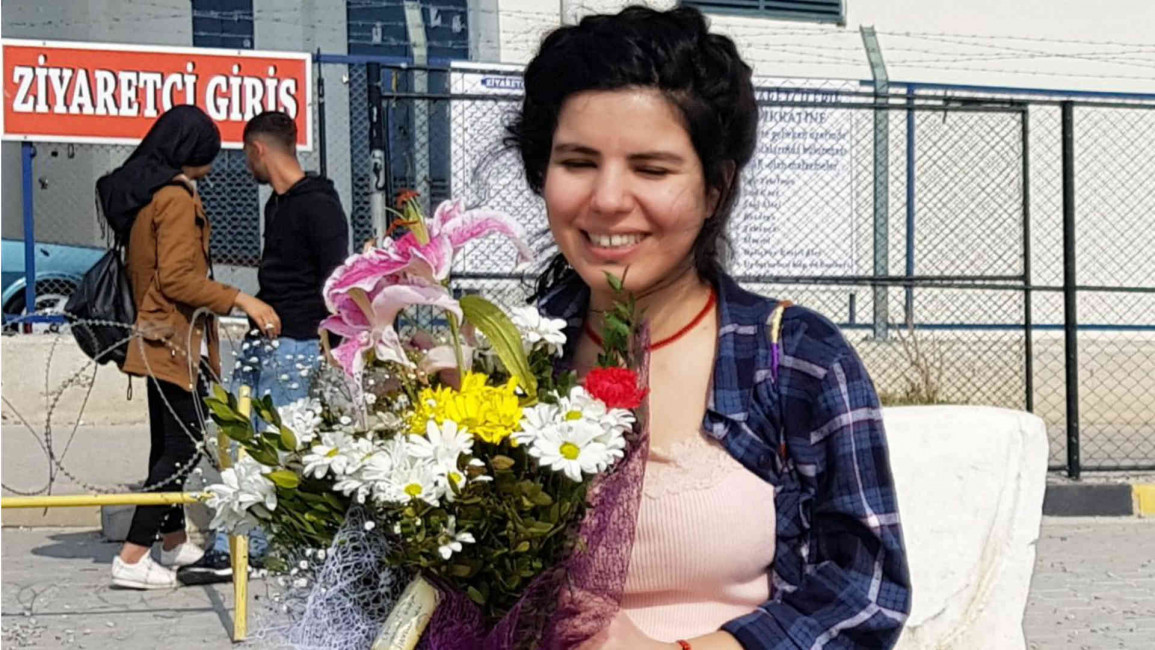Banksy-backed Kurdish journalist Zehra Dogan released from Turkish prison following detention over painting
Kurdish journalist and artist Zehra Dogan was on Sunday released from prison in Turkey, where she served 20 months for a painting the Turkish government deemed "terrorist propaganda".
Dogan was sentenced to almost three years in prison for a painting depicting the destruction of Nusaybin, a town in the Kurdish-majority province of Mardin which was targeted by the Turkish army after tensions between the government and the Kurdistan Workers' Party (PKK) flared up in 2015.
The courts deemed Dogan's painting "propaganda" for the PKK, a Kurdish separatist militia which has been engaged in a protracted on-and-off civil war with the Turkish state since the 1980s, and which Ankara deems to be a terrorist organisations.
The journalist was also accused of producing PKK "propaganda" in her social media posts and news reports.
"They asked me why did you depict the Turkish flag on these destroyed buildings," the journalist tweeted after her sentencing.
"Whereas, they are the ones who took the photograph. I only painted it."
Dogan's artistic inspiration was a photo, spread on social media in 2016, depicting devastated buildings in Nusaybin draped in Turkish flags. A group of Turkish soldiers and army vehicles are featured in the forefront of the image.
![The painting for which Doğan was sentenced to prison [Twitter] The painting for which Doğan was sentenced to prison [Twitter]](https://www.newarab.com/sites/default/files/styles/medium_16_9/public/media/images/C4736433-B551-46F2-9408-CBFB474BADA9.jpg?h=3ca652f7&itok=_MlPVyKf)
Nusaybin was deemed a hotbed for PKK activity after the conflict between the group and the Turkish state, dormant for more than a decade, was renewed in 2015. The town, located on Turkey's border with Syria, was subject to weeks-long curfews and extended military operations.
The most intense period of fighting came during a 134-day curfew between March and June 2016. Around 6,000 buildings were destroyed or heavily damaged; around 30,000 lost their homes; and at least 24 civilians were killed in 2016, according to Crisis Group.
Dogan founded the Kurdish feminist news agency, JINHA, which was shut down in 2016 along with 180 other media outlets following a failed coup attempt that year.
While in prison, the journalist continued to write and produce art although she lacked materials, using food and even her own blood as paint on makeshift canvases made from letters, milk cartons and newspapers. Dogan also founded the Ozgur Gundem Zindan (Free Agenda Dungeon) newspaper with her fellow inmates while in prison.
"I was waiting for the day when my sentence would come to an end, I am very happy. I am sad that I have left my friends inside. I extend my thanks to every single person who supported me during this process," Doğan told bianet after her release.
Dogan's case has attracted widespread international support, including from artists Banksy and Ai Weiwei. She was nominated for the Index on Censorship 2019 Freedom of Expression Arts Award.
She also expressed support for the more than 300 Kurdish political prisoners currently on hunger strike, Ahval reported. Led by Kurdish MP Leyla Guven, the prisoners have now been on hunger strike for four months.
"While I was leaving the prison, the voices of children and their mothers were coming behind the door," said the journalist.
"They were calling after me and said, 'Zehra, Zehra, you are going to see the trees, children and birds now. Zehra, draw their pictures and send them to us'."



